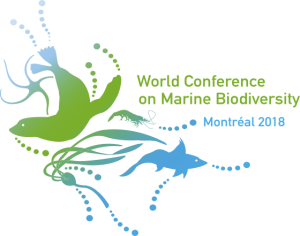- Home
- Science Outputs
- Arctic Science at Conferences
- World Conference on Marine Biodiversity 2018
World Conference on Marine Biodiversity 2018
13-16 May 2018 at Montreal, CanadaThe World Conference on Marine Biodiversity (WCMB) has become the major focal assembly to share research outcomes, management and policy issues, and discussions on the role of biodiversity in sustaining ocean ecosystems. In 2018, it takes place at the Palais des congrès in Montreal, Canada.
Schedule of presentations by Changing Arctic Ocean investigators
Sunday 13 May: Session BIODIVERSITY DISCOVERY AND PREDICTION – Polar Frontiers, 10.30 to 12.00
- Prof Steve Widdicombe: “Benthic biodiversity along a temperate-polar gradient: Exploring consequences of climate change and sea ice loss.”
Thursday 16 May: Session ECOLOGICAL TRAITS & ECOSYSTEM FUNCTIONING, 10.30 to 12.00
- Dr Jasmin Godbold: “The impact of biotic and abiotic context on functional trait expression and marine benthic ecosystem functioning.”
Abstract
Prof Steve Widdicombe: “Benthic biodiversity along a temperate-polar gradient: Exploring consequences of climate change and sea ice loss.”
The Bear Island Trough runs north-south across the Barents Sea and connects the North Atlantic and Arctic basins. The structure, diversity and function of sediment communities inhabiting this trough are shaped by a combination of environmental drivers, with temperature and food supply exerting the strongest influence . In July-August 2017, seabed sampling was conducted along a transect of 6 stations, running from the southern entrance of the trough (S of Svalbard) to the point where the trough meets the Arctic basin (NE of Svalbard). This transect spans the retreat of sea-ice over the last four decades. The southernmost stations experience open water conditions all year while the northernmost stations are partially covered by ice. Here we present results from a suite of samples taken at each station. Using a combination of corers, trawls and camera systems we describe the fauna from meiofauna to the largest macrofauna. These data will contribute to the larger ChAOS (Changing Arctic Ocean Sediments) project which aims to determine the effects of warming and sea ice loss on the biodiversity and biogeochemical function of arctic sediments. Sampling will be repeated in 2018 and 2019 to aid exploration of the influence of sea-ice conditions experienced across years.
http://www.wcmb2018.org/
World Conference on Marine Biodiversity 2018

Montreal, Canada


